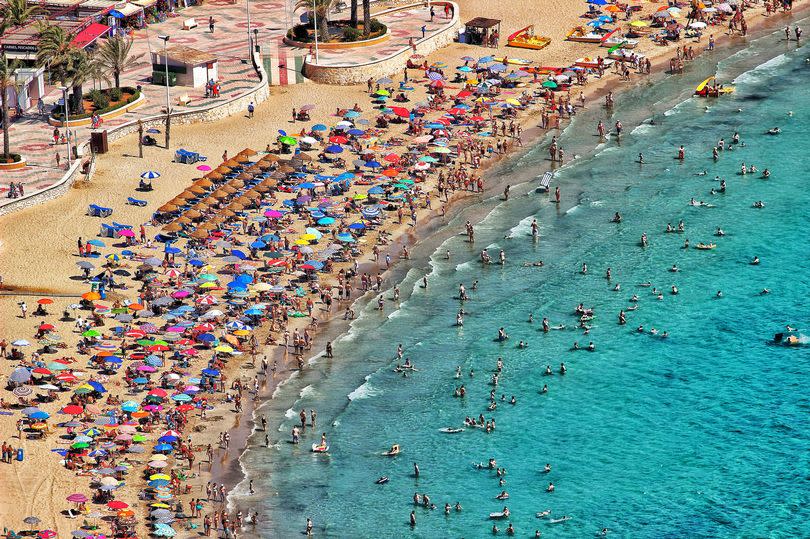Holiday warning as 14 cases of multiple infection reported in EU countries including Spain, Italy and France

An invasive mosquito species has been discovered in 13 EU countries, including France, Spain and Greece, with experts attributing the rise in dengue fever in Europe to their presence. The European Centre for Disease Prevention and Control (ECDC) has stated that climate change is providing favourable conditions for the spread of the tiger mosquito.
Even as far north as Paris, where the Olympic Games are set to take place at the end of July, authorities have been actively monitoring and trapping these insects. The ECDC has issued a warning that international travel could further increase the risk of more outbreaks across Europe, the BBC reported.
They have advised people to eliminate stagnant water from gardens or balconies, which serve as breeding grounds for mosquitoes, and to use repellents and mosquito nets during the night. A man was spotted hunting for these invasive mosquitoes in Paris near the Stade de France on 28 May.
Over the past two decades, mosquitoes have become an increasing threat in Europe. The Asian tiger mosquito, aedes albopictus, considered the most invasive mosquito species globally, is now spreading across Europe from its southern European 'base camp'. It has established itself in Austria, Bulgaria, Croatia, France, Germany, Greece, Hungary, Italy, Malta, Portugal, Romania, Slovenia and Spain, as per the ECDC.
This mosquito species has also been recorded in Belgium, Cyprus, Czechia, the Netherlands and Slovakia. Tiger mosquitoes, known for spreading diseases such as dengue fever, chikungunya, and Zika virus, have traditionally been found in parts of Africa, Asia and the Americas.
Another mosquito species, aedes aegypti, which is responsible for transmitting yellow fever among other diseases, has established itself in Cyprus. Experts are expressing concern over its potential spread to other parts of Europe due to its preference for biting humans and its disease transmission capabilities.
Dengue fever is a viral disease transmitted by certain types of mosquitoes. It usually starts with flu-like symptoms such as:
fever
headache
muscle and joint pain
rash
Symptoms appear in humans 3-14 days after infection.
In some cases, the disease can become severe, leading to conditions like dengue hemorrhagic fever and dengue shock syndrome. When the disease is severe, the risk of mortality is higher. There are four types of viruses that cause dengue, and being immune to one type does not protect against the others.
Last year, France recorded eight incidents of multiple infections, Italy had four, and Spain reported two.
Most cases in Europe are imported, reflecting the global movement of people and trade. Imported cases surged to nearly 5,000 last year. However, locally-acquired infections are also on the rise: 130 people were affected in 2023, up from 71 the previous year.
The West Nile virus, another disease transmitted by mosquitoes, is now found in more European regions than ever before. In early March, one person was reported to be infected by the virus in southern Spain. This highlights how climate conditions are creating suitable environments for mosquitoes even "very early in the year", according to the ECDC.
For individuals, protective measures include:
using mosquito repellent
the use of mosquito nets
sleeping or in screened or air-conditioned rooms
wearing clothing that covers most of the body.
Preventative measures also focus on controlling the mosquitoes that spread the virus.
Some ways to reduce mosquito breeding sites include:
Regularly removing or treating open containers with stagnant water, like flower pots, tree holes, and rock pools.
Ensuring water containers, barrels, wells, and storage tanks are well covered.
During outbreaks, aerial spraying of insecticides can be used to get rid of adult mosquitoes and mitigate the spread of the disease.
"Europe is already seeing how climate change is creating more favourable conditions for invasive mosquitos to spread into previously unaffected areas and infect more people with diseases such as dengue," warned Andrea Ammon, the director of ECDC.
She added: "Increased international travel from dengue-endemic countries will also increase the risk of imported cases, and inevitably also the risk of local outbreaks." Ammon advises Brits to take "personal protective measures", adding that "early detection of cases, timely surveillance, further research and awareness-raising activities are paramount in those areas in Europe most at risk".
According to the World Health Organization (WHO), Dengue fever is endemic in more than 100 countries worldwide, with over six million cases and 7,000 deaths reported last year. Countries like Bangladesh, Malaysia, Thailand and Vietnam see the highest number of cases.
Malaria, the deadliest mosquito-borne disease globally, spreads through the bites of infected female mosquitoes called anopheles, which have also been found in Europe. There are growing concerns that incidents of malaria could also spike on the continent in the future, if conditions are right.

 Yahoo News
Yahoo News 
